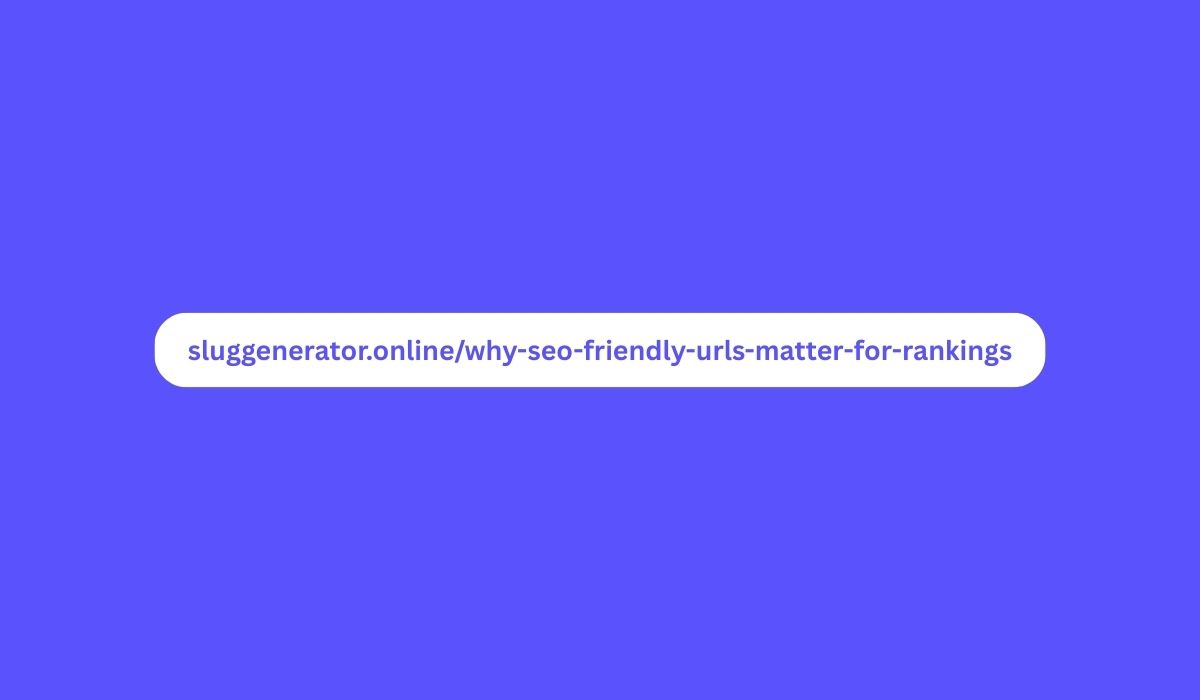In the ever-evolving landscape of search engine optimization, one element remains consistently important: URL structure. While flashy new AI features and algorithm updates grab headlines, the humble URL continues to play a crucial role in how both search engines and users interact with your website.
At SlugGenerator.Online, we understand the power of well-structured URLs. In this comprehensive guide, we’ll explore why SEO-friendly URLs matter for rankings, user experience, and even AI-driven search results.
The Anatomy of an SEO-Friendly URL
Before diving into why URLs matter, let’s clarify what constitutes an SEO-friendly URL. A well-structured URL typically includes:
- Protocol – HTTPS for security
- Domain name – Your website address
- Path – Hierarchical structure showing content organization
- Slug – Descriptive, keyword-rich end portion
Example: https://sluggenerator.online/blog/seo-friendly-urls
Key Insight: Google’s John Mueller has confirmed that while URL structure is not a major ranking factor, it significantly impacts how search engines understand and categorize your content.
Debunking Common URL Myths
Myth 1: Shorter URLs Rank Better
Many SEOs believe that shorter URLs have a ranking advantage. However, Google has repeatedly clarified that URL length does not directly influence rankings.
Recent analysis of 3,123 URLs cited in Google’s AI Overviews revealed an average length of 53 characters (excluding domain), with minimal difference between traditional blue links and AI-cited URLs.
The Reality: While extremely long URLs with unnecessary parameters can cause issues, focus on descriptive clarity rather than arbitrary shortening.
Myth 2: Keywords in URLs Are a Major Ranking Factor
Keywords in URLs do provide a minor ranking signal, but their importance is often overestimated. Google primarily uses URL keywords during the initial discovery phase before crawling your content.
Once Google processes your page’s actual content, the URL’s keyword relevance becomes significantly less important for rankings.
Why URL Structure Matters for SEO
1. Improved User Experience
Readable URLs act as a miniature content preview. When users see a clear, descriptive URL in search results or when shared on social media, they’re more likely to click.
Compare these two examples:
- Unfriendly:
https://example.com/p=45832?id=234&cat=12 - Friendly:
https://example.com/blog/seo-friendly-urls-guide
The second URL clearly communicates what the page is about, increasing click-through rates and reducing bounce rates.
2. Enhanced Crawlability and Indexation
Search engines use URL structure to understand your site’s hierarchy and content relationships. A logical structure helps crawlers efficiently discover and index your content.
Pages closer to the homepage (with fewer clicks required) typically receive more crawl budget and are often perceived as more important.
3. Ranking Benefits
While URL keywords provide only a minor direct ranking boost, they contribute to SEO success in other ways:
- Increased click-through rates from search results
- Better anchor text when URLs are copied as links
- Improved context for search engines understanding content
4. AI and Featured Snippets
With the rise of AI-powered search, URL permanence has become increasingly important. AI systems frequently cite URLs in their responses, and broken links undermine credibility.
Well-structured URLs are more likely to be properly recognized and cited by AI systems, providing valuable visibility in next-generation search interfaces.
URL Best Practices for SEO
Actionable Tips for SEO-Friendly URLs
- Use hyphens to separate words – Not underscores or spaces
- Keep it readable and logical – Match your site’s content hierarchy
- Include relevant keywords – But avoid stuffing
- Use lowercase letters consistently – Prevent duplicate content issues
- Keep it concise but descriptive – Balance clarity with brevity
- Avoid unnecessary parameters – Use them only when essential
- Implement proper redirects – When changing URLs, use 301 redirects
The AI Factor: URLs in the Age of Intelligent Search
As search evolves with AI integration, URLs face new challenges and opportunities. Our research shows that AI systems:
- Cite URLs at similar rates to traditional search results
- Struggle with dynamic or temporary URLs that frequently break
- Benefit from clear, descriptive URLs that accurately represent content
This makes URL permanence and clarity more important than ever for maintaining visibility across all search interfaces.
Common URL Mistakes to Avoid
| Mistake | Problem | Solution |
|---|---|---|
| Dynamic parameters | Creates duplicate content issues | Use static, descriptive URLs |
| Session IDs in URLs | Causes infinite crawl spaces | Store IDs in cookies instead |
| UpperCase and LowerCase Mixing | Creates technical duplication | Consistently use lowercase |
| Stop words | Unnecessary length | Remove words like “a”, “the”, “and” |
| Keyword stuffing | Looks spammy to users and engines | Use 1-2 relevant keywords maximum |
How to Create SEO-Friendly URLs
Creating optimized URLs doesn’t need to be complicated. Follow this simple process:
- Identify the primary keyword for your content
- Create a hierarchical structure that matches your site architecture
- Separate words with hyphens
- Remove unnecessary words and parameters
- Keep it under 60 characters when possible
- Use our free slug generator tool to quickly create optimized URL slugs
Conclusion: URLs Still Matter in Modern SEO
While URL structure may not be the most powerful ranking factor, it plays a crucial supporting role in SEO success. Well-crafted URLs improve user experience, enhance crawlability, and maintain their importance in the age of AI-powered search.
Rather than obsessing over minor URL optimizations, focus on creating a logical, readable structure that serves both users and search engines. Implement proper redirects when changing URLs, and remember that clarity always trumps cleverness.
At SlugGenerator.Online, we help marketers and content creators develop SEO-friendly URL structures that stand the test of time. Whether you’re optimizing an existing site or launching a new one, paying attention to URL best practices will yield long-term benefits for your search visibility.

Leave a Reply